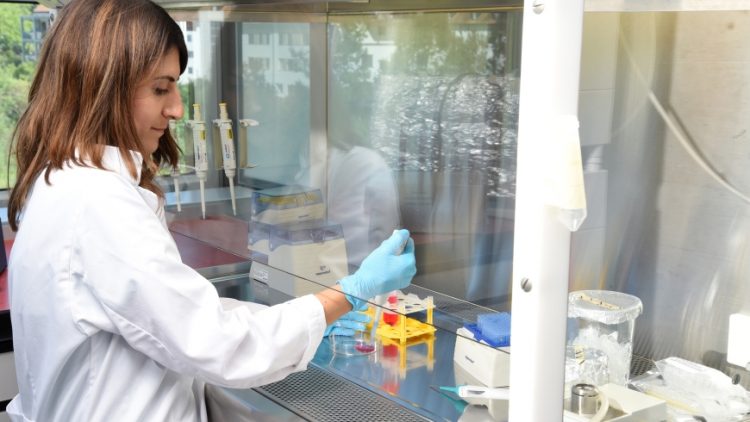Treating arthritis with algae

Cell tests in Empa laboratory. Image: Empa
Arthritis is the most-widespread joint disease, with around 90 percent of all people over 65 being affected to varying degrees, but this degenerative disease is also widespread amongst younger people. In arthritis, the cartilage in the joint, a type of protective layer on bones that “lubricates” the joint, degenerates over time.
This can be extremely painful for sufferers, because inflammatory reactions are associated with cartilage degeneration. In the later stages of the disease, bones are no longer adequately protected and can directly rub against each other.
Arthritis can affect all joints in the body, but most often affects the knee joint, hip joint and fingers. The disease has been considered incurable until now. Current treatment methods, such as anti-inflammatory drugs and painkillers, mainly address the symptoms. Often, the only remaining option is an operation to replace the affected joint with an artificial one.
Initial research results are encouraging
In laboratory tests, the team led by ETHZ researcher Marcy Zenobi-Wong and Empa researcher Katharina Maniura has now succeeded, together with SINTEF in Norway, in identifying a substance with the potential to halt cartilage degeneration in joints. This substance is the polysaccharide alginate extracted from the stems of brown algae – or more precisely cuvie (Lat. Laminaria hyperborea), which is similar to specific extracellular biomolecules in cartilage.
The researchers chemically modified the alginate with sulfate groups and then added it in dissolved form to cell cultures to examine the reaction of various cell types to the modified polysaccharide. This revealed that alginate sulfate can significantly reduce oxidative stress, which is a frequent cause of cell damage or even cell death, and the more sulfate groups attached to the alginate molecule, the greater this reduction.
Alginate sulfate was also able to suppress the inflammatory reaction, again depending on the number of sulfate groups, and was able to down-regulate the expression of genes that trigger an inflammatory reaction in both human cartilage cells, known as chondrocytes, and in macrophages, the “scavenger cells” of our immune system. The algal molecules should therefore slow down cartilage degeneration. “The hope is that they can even stop this degeneration,” says Empa researcher Markus Rottmar.
Further research work necessary
The alginate sulfates have so far only been tested in vitro, i.e. in the laboratory with cell cultures. However, the encouraging results mean that research will now continue. The next stage is to test the substances on animals. If this is also successful, clinical trials can then be conducted on people. These tests are, however, laborious and time-consuming. If everything were to work perfectly, it would still be a few years before arthritis patients could be treated with alginate sulfate.
Media Contact
All latest news from the category: Life Sciences and Chemistry
Articles and reports from the Life Sciences and chemistry area deal with applied and basic research into modern biology, chemistry and human medicine.
Valuable information can be found on a range of life sciences fields including bacteriology, biochemistry, bionics, bioinformatics, biophysics, biotechnology, genetics, geobotany, human biology, marine biology, microbiology, molecular biology, cellular biology, zoology, bioinorganic chemistry, microchemistry and environmental chemistry.
Newest articles

Properties of new materials for microchips
… can now be measured well. Reseachers of Delft University of Technology demonstrated measuring performance properties of ultrathin silicon membranes. Making ever smaller and more powerful chips requires new ultrathin…

Floating solar’s potential
… to support sustainable development by addressing climate, water, and energy goals holistically. A new study published this week in Nature Energy raises the potential for floating solar photovoltaics (FPV)…

Skyrmions move at record speeds
… a step towards the computing of the future. An international research team led by scientists from the CNRS1 has discovered that the magnetic nanobubbles2 known as skyrmions can be…





















